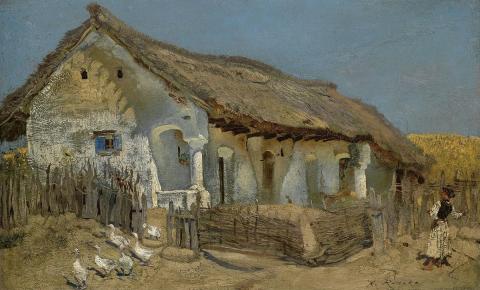Wilhelm Freund, who was persecuted as a Jew, left Vienna in 1938 to study law in Oxford. As the only son of bank director Richard Freund (1878–1934) and Gina Freund, née Rubel (1892–1935), he was the sole heir of his parents' art collection. In 1938 he applied for export authorization for the transport goods stored with Spedition Gustav Knauer. The export decision of November 1938 referred to a memo by treasurer Ivo Hans Gayrsperg documenting paintings by Max Liebermann and Franz von Lenbach as well as silverware, applied art and other consumer items. Authorization was denied for nine objects. Vienna Municipal Department (MA) 50 secured them in December 1938 and ordered them to be transferred to the Kunsthistorisches Museum. They included the paintings Medea at the Urn by Anselm Feuerbach, Hungarian Farm by Anton Romako, Woman Reading in an Oriental Costume by Friedrich Amerling, Portrait of a Woman by Hans Canon and a landscape by Arnold Böcklin. In 1939 the Österreichische Galerie purchased the works by Feuerbach and Romako and paid the sum of 45,500 Reichsmarks minus storage fees to Freund's frozen account. According to Bruno Grimschitz, director of the Österreichische Galerie, Medea alone was worth 80,000 Reichsmarks. The paintings by Canon, Böcklin and Amerling were transferred in 1939 to the Zentralstelle für Denkmalschutz (Central Monument Protection Office) for safekeeping. All efforts by Freund's lawyer to export the stored goods appear to have failed. By order of the Gestapo, the stored goods were removed in 1941 by Spedition Knauer and auctioned by Vugesta. Under § 6 of the Verordnung über den Verlust der Protektoratsangehörigkeit (Regulation on the Loss of Protectorate Citizenship) of 2 November 1942, Wilhelm Freund was stripped of his citizenship in 1943, as recorded in the Reichsanzeiger, and thus forfeited his assets to the German Reich. The Institut für Denkmalpflege (Institute for Monument Preservation) transferred the works by Canon, Böcklin and Amerling in 1944 for storage at Salzbergwerk Altaussee.
Unlike many objects in Altaussee, the items from the Freund collection were not transferred to the Central Collecting Point in Munich after the war, but remained at the mine. In March 1946, the United State Forces in Austria handed them to the Bundesdenkmalamt (Federal Monuments Authority) with the indication "Freund, Vienna", and they were stored in the 1950s in the Bodenkreditanstalt depot before being transferred in 1966 to the former Mauerbach charterhouse. The Böcklin painting was claimed under the Zweites Kunst- und Kulturgutbereinigungsgesetz (Second Art and Cultural Property Settlement Act), incorrectly as it turns out, but it was nevertheless handed to the claimant in 1994. Woman Reading in Oriental Dress and Portrait of a Woman were auctioned in 1996. Medea at the Urn and Hungarian Farm were reported by the Österreichische Galerie in 1946 as expropriated pursuant to the Vermögensentziehungs-Anmeldeverordnung (Asset Expropriation Reporting Regulation) with even the former owner and address being given. In spite of a report by the Finanzlandesdirektion Wien (Vienna provincial tax office) to the Federal Ministry of Finance in 1969 unambiguously identifying Medea at the Urn has having been expropriated from Wilhelm Freund's collection, there is no record of an attempt at restitution at this time. After detailed research by the Commission for Provenance Research, the Art Restitution Advisory Board recommended on 30 October 2002 that Medea by Anselm Feuerbach and Hungarian Farm by Anton Romako be restituted. In 2009 the paintings were returned to the heirs of Wilhelm Freund.

